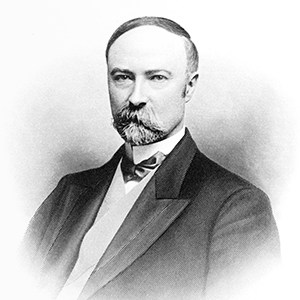Charles Warren Fairbanks served as Vice President of the United States under President Theodore Roosevelt. Ironically, it was President Roosevelt that thwarted Fairbanks’ efforts to seek the country’s highest office.
Early Life
Charles Fairbanks was born in Ohio in 1852. He attended Ohio Wesleyan and then Cleveland Law College. After marrying Cornelia Cole, Fairbanks moved to Indianapolis, Indiana, where he worked as attorney with the Chesapeake and Ohio railroad system. Fairbanks built a successful law practice representing several railroad interests in the Midwest.
Political Career
Fairbanks used his growing wealth and reputation to help several Indiana Republicans win political office and ultimately became a leader in the state’s Republican party. In 1896, he ran William McKinley’s campaign in Indiana and gave a stirring speech at the Republican National Convention. Fairbanks was elected to his first political office the same year, winning a seat in the U.S. Senate.
As a Senator, Fairbanks was close adviser to President McKinley, particularly during the Spanish–American War. He also served as the Chairman of the Committee on Immigration and the Committee on Public Buildings and Grounds. Fairbanks was reelected in 1902, and he served until his election as Vice President of the United States.
Vice President
Fairbanks was not Roosevelt’s first choice as a running mate. However, Fairbanks’ conservative reputation and allegiance to the party’s the Old Guard balanced Roosevelt’s progressive ideology. The ticket easily won the 1904 election. As Vice President, Fairbanks was rarely consulted by President Roosevelt and instead focused on presiding over the Senate. In this role, Fairbanks was instrumental passing the Hepburn Act and the Pure Food and Drug Act.
After Roosevelt announced that he would not seek re-election, Fairbanks sought the Republican nomination for President in 1908. However, the President publicly supported William Howard Taft as his successor, forcing Fairbanks to abandon his presidential ambitions. In 1916, Fairbanks ran for Vice President alongside Charles Evans Hughes; however, they lost to Democratic incumbents Woodrow Wilson and Thomas Marshall.









